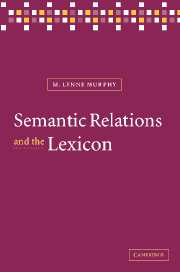Book contents
- Frontmatter
- Contents
- Acknowledgments
- Symbols and typographical conventions
- Part I Paradigmatic relations, generally
- Part II Paradigmatic relations, specifically
- 4 Synonymy and similarity
- 5 Antonymy and contrast
- 6 Hyponymy, meronymy, and other relations
- 7 Lexicon and metalexicon: implications and explorations
- Appendix: Relation elements
- Notes
- References
- Index
5 - Antonymy and contrast
Published online by Cambridge University Press: 22 September 2009
- Frontmatter
- Contents
- Acknowledgments
- Symbols and typographical conventions
- Part I Paradigmatic relations, generally
- Part II Paradigmatic relations, specifically
- 4 Synonymy and similarity
- 5 Antonymy and contrast
- 6 Hyponymy, meronymy, and other relations
- 7 Lexicon and metalexicon: implications and explorations
- Appendix: Relation elements
- Notes
- References
- Index
Summary
What's the opposite of actor?
The answer's very simple: tractor.
I said that just because it rhymes,
As lazy poets do at times.
Richard Wilbur, Opposites (1973)Antonymy (referring to binary opposition generally) is arguably the archetypical lexical semantic relation. Unlike synonymy, everyone agrees that antonymy exists, and it is robustly evident in natural language. Unlike hyponymy and meronymy, it can be as much a relation among words as it is a relation among concepts or denotata. Being such a good example of a lexical semantic relation, antonymy is also the focus of much of the debate as to whether semantic relations are stored or derived and whether they are intralexically or metalexically represented. This chapter is focused on that debate and on why contrast involving semantic incompatibility is so central a semantic relation. Section 5.1 presents the metalexical approach to antonymy and incompatible contrast sets, in which antonyms may be metalexically stored, but only count as antonyms if they are also derivable by Relation by Contrast. In 5.2 properties of antonymy that have been proposed in the linguistic literature, including symmetry, markedness, and binarity, are reviewed, then 5.3 covers antonym subtypes and how RC accounts for them. Section 5.4 concerns the roles of antonymy and non-binary semantic contrast in natural language in discourse, semantic or lexical change, language acquisition, and across cultures. Section 5.5 provides a summary.
Information
- Type
- Chapter
- Information
- Semantic Relations and the LexiconAntonymy, Synonymy and other Paradigms, pp. 169 - 215Publisher: Cambridge University PressPrint publication year: 2003
Accessibility standard: Unknown
Why this information is here
This section outlines the accessibility features of this content - including support for screen readers, full keyboard navigation and high-contrast display options. This may not be relevant for you.Accessibility Information
- 1
- Cited by
